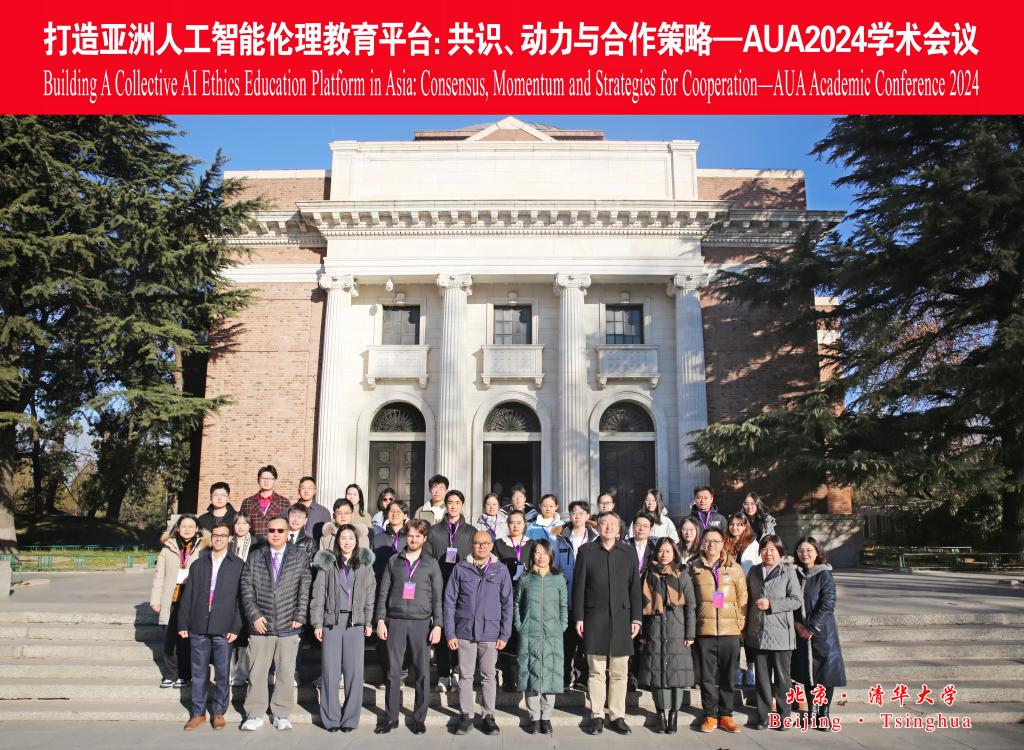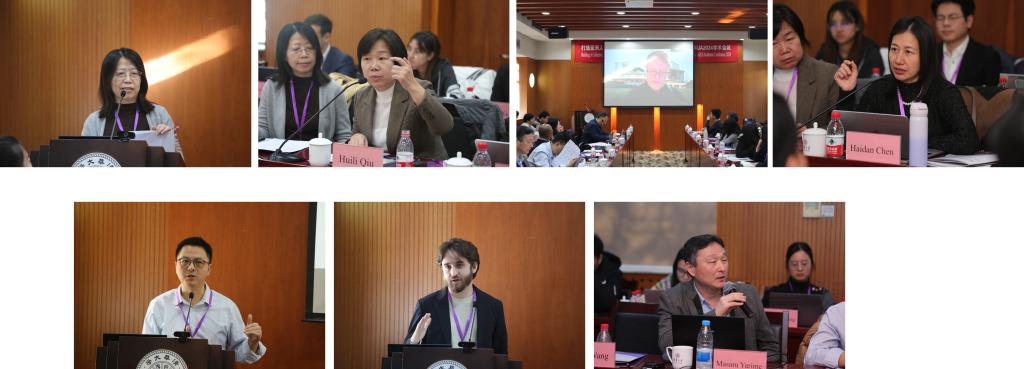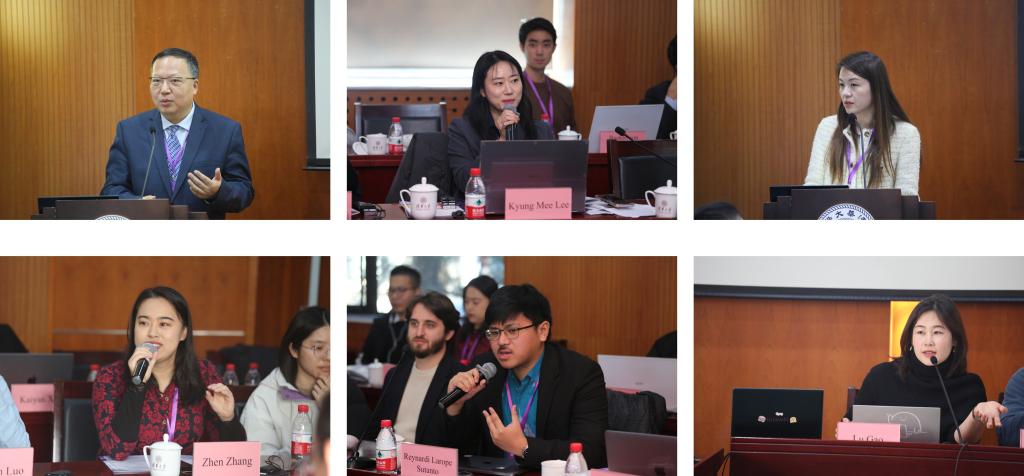From December 7 to 8, 2024, an AUA academic conference themed “Building A Collective AI Ethics Education Platform in Asia: Consensus, Momentum and Strategies for Cooperation” was held at Tsinghua University. The conference was jointly organized by the Secretariat of the Special Initiative on Science and Technology Ethics Education in Chinese Universities and the Center for Science, Technology, and Society Studies at Tsinghua University in collaboration with the Asian Universities Alliance (AUA).

The conference aimed to promote in-depth dialogue among AUA member universities, advancing broad consensus on topics related to AI ethics governance and AI ethics education. The conference brought together over 50 faculty and student representatives from AUA member universities, including Tsinghua University, Peking University, Seoul National University, Hong Kong University of Science and Technology, National University of Singapore, University of Indonesia, the United Arab Emirates University, and Chulalongkorn University. The participants engaged in extensive academic exchanges on topics such as how to conduct AI ethics education in the context of Asia's diverse cultural backgrounds, how to integrate local cultural characteristics, build an education system that meets societal needs, and cultivate outstanding talents with social responsibility and ethical awareness.

Asian Universities Alliance Secretary Jian Liu, also a professor from the School of Architecture at Tsinghua University, delivered a welcome speech at the opening ceremony. Professor Liu first welcomed all representatives from the AUA member universities and Tsinghua’s partner institutions. She emphasized that while AI is reshaping the human world, it also brings ethical issues such as digital privacy and algorithmic bias. These issues require deep reflection, ample dialogue, and collective action. She pointed out that despite their diverse cultural backgrounds and academic experiences of the attendees, the participants shared a common goal—to establish a cross-cultural, interdisciplinary platform that facilitates dialogue and collaboratively shapes AI ethics education both within and beyond Asia.
Professor Zhengfeng Li, representing the Center for Science, Technology, and Society Studies at Tsinghua University and the Secretariat of the Special Task Force on Higher Education Technology Ethics, made opening remarks. Professor Li shared his views on AI ethics education from three aspects: the development of AI and the deepening of human self-awareness, the challenges of interdisciplinary and cross-sectoral research in AI ethics education, and the promotion of multinational cooperation to build an AI ethics education platform in Asia. He highlighted that AI ethics education is not just a technical issue but also a matter of social responsibility and human values. Professor Li emphasized the need for joint participation from governments, businesses, and society to build broad consensus and drive the establishment of an Asian AI ethics education platform.
Professor Wei Hong, Deputy Director of the Center for Science, Technology, and Society Studies at Tsinghua University, set the stage for an engaging keynote session by introducing the Center’s development and key initiatives. The session featured an impressive lineup of experts who tackled pressing ethical questions at the intersection of science, technology, and society. Researcher Huili Qiu from Tsinghua University opened the discussion with her insightful presentation, “Science and Technology Ethics Education in Chinese Universities in Action: Introduction to The Special Initiative,” highlighting innovative approaches to ethics education in China.
Professor Volker Schmidt from the National University of Singapore followed with a thought-provoking talk, “Taming AI with Morals? Skeptical Notes,” questioning the feasibility of regulating AI through moral frameworks. Associate Professor Haidan Chen of Peking University offered a fascinating ethical analysis in her presentation, “Does Brain-Computer Interface-Based Mind Reading Threaten Mental Privacy? Ethical Reflections from Interviews with Chinese Experts.”
Associate Professor Xiaofeng Tang from Tsinghua University explored the transformative potential of AI in education with his presentation, “Empowering Engineering Ethics Education Through Generative AI.” Associate Professor Masaru Yarime from The Hong Kong University of Science and Technology provided a sectoral perspective with his talk, “A Sectoral Analysis of AI Development and Deployment: Implications for AI Ethics and Governance.”
Gleb Papyshev, also from The Hong Kong University of Science and Technology, addressed challenges in academia with his presentation, “Ethical Challenges of AI Usage in Social Science Education and Research.” Fangxin Yi from the same institution expanded on this theme with her talk, “Ethical Considerations and Governance in AI-Supported Decision-Making: Implications for Public Policy and Education.”

Professor Minsu Ha and his team from Seoul National University showcased practical applications in their presentation, “AI Technology for Teacher-Led Descriptive Assessment: A Case Study of the SAAI System.” Associate Professor Kyungmee Lee and her team, also from Seoul National University, offered a critical perspective with their presentation, “ANT in EdTech Studies: Methodological Possibilities, Limitations, and Dangers for Ethics in AI and Education.” Finally, Associate Professor Yingqiu Xie from Nazarbayev University closed the session with a compelling call to action in his talk, “Urgency to Establish A United AI Ethical Education Association or Network for Education, Academic Integrity, and Equity.”
The youth seminar showcased the innovative research and fresh perspectives of young scholars from AUA member universities, highlighting the next generation’s contributions to the field of AI ethics. Reynardi Larope Sutanto from the University of Indonesia opened the session with his insightful presentation, “The Black Box Problem: Ethical Challenges and Educational Strategies for AI Utilization in Medicine,” shedding light on the complexities of AI in healthcare. Shanshan Luo from The Hong Kong University of Science and Technology explored the human-machine dynamic with her thought-provoking talk, “Constructing a Value Framework for Ethics Education in AI Disciplines: A View from the Perspective of Human-Machine Relations.”

Tianyu Liu from Tsinghua University introduced an emerging perspective on digital ethics in the intelligent age through his presentation, “Ethics of Computing Power: A New Form of Digital Ethics in the Intelligent Era.” Hamin Lee from Seoul National University tackled ethical and behavioral dimensions of AI adoption in her engaging talk, “AI Usage Among University Students in South Korea: Exploring Behavioral Determinants and Ethical Considerations Based on the Integrative Model of Behavioral Prediction (IMBP).” Jiajing Huang from Chulalongkorn University provided a cross-regional perspective with her analysis, “Ethical Issues of Using AI in Education: A Survey of Students’ Views from Southeast Asian Countries.”
At this conference, experts and young scholars from AUA member universities shared 22 academic presentations on topics such as AI ethics governance, application of AI in education, and AI risk management. On the evening of December 7, a Youth Salon was held, and on the afternoon of December 8, a roundtable forum took place. These sessions fostered in-depth dialogue and exchanges, helping to bring the participants closer together. Attendees expressed that the content and information shared at the conference expanded their knowledge, broadened their perspectives, and inspired deep reflection. More importantly, the two-day event allowed them to find their research collaborators. As the AUA Secretariat Chief Administrator Ms. Fang Yanhua commented, the conference has established a strong foundation for developing an AI ethic education cooperation platform in Asia, and AUA will continue to support these efforts.
